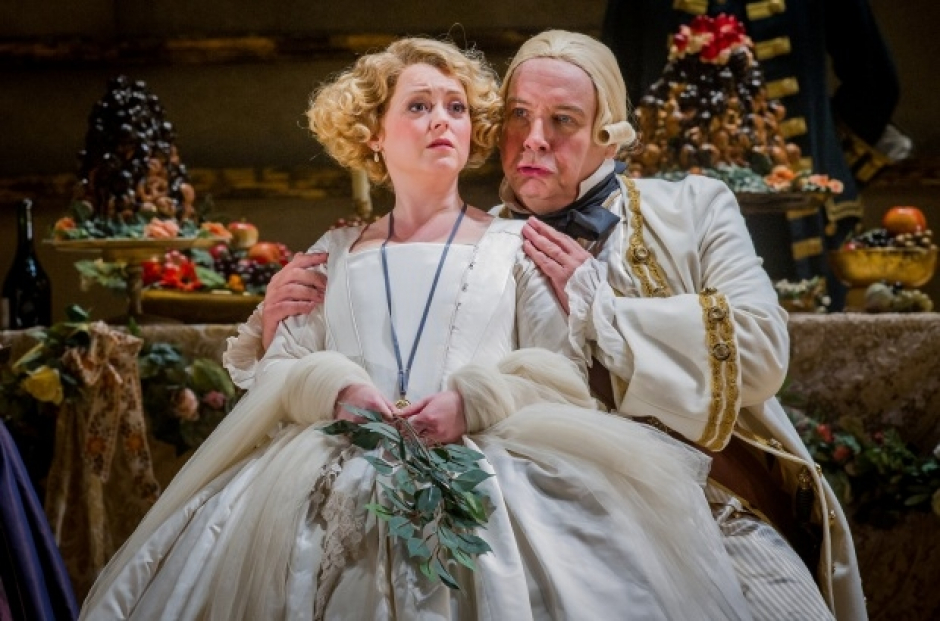Der Rosenkavalier, Opera North at The Lowry, directed by David McVicar; November 9 2016.
In the Act III of Der Rosenkavalier, after he has been subject to the torments of a farcical trap to expose him as the grasping, bewigged horndog that he is, the bewildered Count Ochs says to his avengers ‘so this has been a Viennese masquerade all along’. Unfortunately for its composer, Richard Strauss, many critics have seen the luxurious opera in exactly the same way. Following his harsh expressionist take on ancient Greek tragedy in Elektra in 1907, many saw Der Rosenkavalier, with its waltzes, its gender-swapping cast and its giddy farce, as a retreat into late Romantic charm.
And in a sense, none of these accusations bothered Strauss. Since finishing Salome in 1905 he had longed for an old-fashioned subject, and when his librettist Hugo von Hofmannsthal mined some obscure eighteenth-century works, among them a little-known play by Moliere, he was ecstatic.
The plot is a farce set in the upper crust of late eighteenth-century Vienna. The Marschallin (the Field Marshal’s wife) is a vivacious and attractive thirty-two year old with a legion of lovers, yet she suffers from intense bouts of chronophobia, constantly worried about ageing and time. She knows her days as a Viennese society doll are numbered. She is having an extramarital affair, a mere notch on her Rococo bed post, with young Count Octavian, but knows that this will soon come to an end when he finds a younger model. When her boorish cousin, the uncouth Count Ochs arrives unexpectedly, the pair are trapped in the bedroom and have to act quickly. So Octavian disguises himself as a woman called Mariandel, for transgender metamorphosis is far easier than just hiding under the bed.
Permanently sniffing around for young women, Ochs chases after Mariandel as he announces his forthcoming marriage to Sophie Faninal, the daughter of a nouveau riche family who are desperate to marry into the aristocracy. To bring these plot strands together, Hofmannsthal invented an entirely new social ceremony. In this decorous era, the groom must send a young Rosenkavalier or ‘Knight of the Rose’ to offer the bride-to-be a silver rose as a token of proposal on his behalf. (We assume that without this ceremony the sloppy vulgarian Ochs would have called in to the nearest truck stop to grab some wilting carnations). The Marschallin recommends Octavian for the post and the farce is complete. When the splendidly armoured young knight arrives with the rose, Sophie and Octavian fall immediately in love; this raises chaos in the Faninal household as her father ironically strives for classier nuptials, and so Octavian decides to trap the Count through seduction.
In the final act, Ochs is exposed as a disreputable dupe and the Marschallin, Octavian, and Sophie rhapsodise about love before the Marschallin gracefully hands over the heroic Octavian to the younger woman.
Although Opera North have revived a production that was last seen fourteen years ago, this particular performance is the first time the singers have taken on these roles. And despite some beautiful moments, the comic temper was lacking. Yvla Kihberg’s Marschallin was far too introverted, far too martyred by high society’s artificial demands to really radiate the character’s charm, and her singing rarely soared over Strauss’ commanding full-scale orchestra. Helen Sherman was an appropriately petulant Octavian though was less convincing as Mariandel , and Fflur Wyn held a beautiful lucid tone throughout as the innocent Sophie, the role Hofmannsthal said was a ‘very pretty girl, but she is also a very ordinary girl, like dozens of others’. Count Ochs was played wonderfully by Henry Waddington, the only fault being that his bass voice occasionally lacked the necessary lightness. Ochs is a seedy raconteur and should skip buoyantly over the ironic waltz leitmotifs, whereas Waddington was at times too cloudy and the chattier moments of the libretto escaped him.
In one of the earliest letters concerning Der Rosenkavalier, Hofmannsthal wrote to Strauss that he had in mind an opera ‘full of burlesque situations and characters, with lively action, pellucid almost like pantomime’. At its best Alexsander Markovic’s revival is passionate and poignant, yet it lacks the costume drama camp, the feel of bourgeois pantomime.

